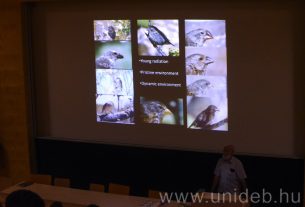Migratory birds are in increasing danger, according to researchers at the University of Debrecen, who came to this conclusion by summarizing the detailed data of about 50 studies in an international project – the University of Debrecen said.
According to the information, the researchers examined the frequency of predators, the spread of parasites, the reproduction of food-producing insects, changes in arctic temperature, and the number of extreme weather events.
It is becoming increasingly risky for thousands of miles to fly for birds breeding in the Arctic. The declining benefits of migration could have serious consequences for the ecosystem as a whole, the article quotes Trends in Ecology & Evolution as quoted in the communication.
As they write, the experts of the University of Debrecen have been studying the effects of climate change on the reproduction strategy of birds for years, led by the internationally renowned ethologist Tamás Székely. Following research carried out as part of the Leadership Excellence competition, in 2018 Science magazine published an article by researchers at the University of Debrecen examining the impact of climate change on the nesting habits of shorebirds. In their new research, the researchers from Debrecen started from the results of previous studies.
Every year, millions of migratory birds fly to the Arctic and northern temperate zones to take advantage of the period richest in foraging insects, lower numbers of predators, and fewer pathogens. However, the trend has changed in recent years. It has already been shown in previous research that the nest predation of shorebirds nesting in the Arctic Circle has increased, but now migratory birds also have to deal with new dangers – quotes Professor Tamás Székely in the communiqué.
Research has shown that these factors individually have a major impact on the success of migratory bird reproduction, and when examined together, it is clear that these factors make the Arctic an increasingly unattractive destination for migratory birds and mammals such as reindeer.
Altered interactions have reduced the reproductive success and survival chances of migratory birds, which may reduce the rate and frequency of bird migration, which could have serious consequences for the structure of the food chain and the Arctic ecosystem as a whole – quotes Vojtech Kubelka, a research fellow at the Department of Evolutionary Zoology and Human Biology, Faculty of Science and Technology, the first author of the article.
According to the researchers, the benefits of migration must be reduced in the long run, and nature conservation must respond with innovative protection measures in order to mitigate the unwanted effect, the summary concludes.
debreceninap.hu
Photo: MTI/Varga György










